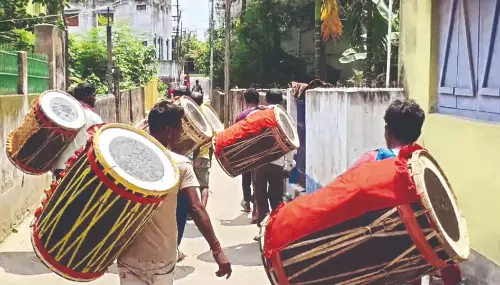Malda: Dhakis torn between livelihood and fear of harassment in other states

Malda: For the traditional ‘dhakis’ (drummers) of Malda, Durga Puja is not just a festival — it is their lifeline. Every year, hundreds of dhakis from Old Malda’s Court Station area travel to other states during the festive season in search of better earnings. However, this year, uncertainty looms large amid the fear of being labelled “illegal Bangladeshis”
in other states.
In their own district, dhakis earn a modest Rs 7,000–Rs 8,000 by playing at Puja pandals. Outside Bengal, the remuneration is often several times higher, which is why many of them prefer going to other states. However, recent incidents of Bengali-speaking migrant workers being detained in other states under suspicion of being “illegal Bangladeshis” have left the dhakis in a tight spot.
“Here in Malda, the money is not enough to sustain our families,” said Binay Rabidas, a veteran dhaki. “In Delhi or Haryana, the same work brings us triple or four times the amount. But now we are afraid to go. Speaking Bengali outside the state has become risky.”
Many dhakis complain of police harassment and administrative questioning whenever they travel. “We are artists, not criminals,” said another dhaki, Kush Rabidas, visibly frustrated. “Why should we be treated with suspicion just because of our language? A government identity card will resolve the issue.”
Adding to their woes is a long-standing demand for recognition. Despite being custodians of a centuries-old tradition, most dhakis do not possess any official certificate identifying them as artists.
As a result, they remain excluded from various government welfare schemes and cultural stipends.
“We have never received any artiste certificate. Other folk artists get monthly honorariums and benefits, but we are left out. The government must recognise us as cultural artists and ensure a monthly allowance for our survival as we are losing strength with ageing,” stated Rabidas.
Local cultural activists have echoed these concerns, pointing out that dhakis form an inseparable part of Bengal’s Durga Puja heritage, recently recognised by UNESCO. “It is ironic that while the world celebrates Durga Puja, the dhakis who create its soul-stirring rhythm continue to struggle for dignity and livelihood,” said Soumen Bhowmik, a cultural activist from English Bazar.
The dhakis are now going to appeal to the state government, urging both recognition and financial support. As the festive season approaches, their plight remains unresolved—caught between the fear of harassment outside Bengal and inadequate earnings at home.



